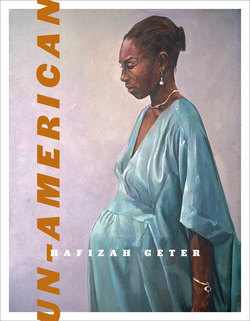Читать книгу Un-American - Hafizah Geter - Страница 2
На сайте Литреса книга снята с продажи.
ОглавлениеPRAISE FOR HAFIZAH GETER’S UN–AMERICAN
“In Un-American, Hafizah Geter creates a new kind of portraiture. A family is slowly etched in relief in language both lush and exacting. This gorgeous debut troubles and reshapes notions of belonging against the backdrop of a country obsessed with its own exclusions, erasures, borders, institutions, and violence. Geter’s poems simmer original forms of witness and resistance.” —Claudia Rankine, author of Citizen
“Hafizah Geter’s Un-American reads like a high lyric conversation overheard. Poem after poem, the most ordinary of items—cups, cards, couches—get ratcheted up into their proper glory. In other words, Geter sees the world as a stage set for what she needs to tell her family but can’t, what she needs to hear from her family but won’t. And all of this is done with attention to what this one beautiful story says about the so-called American story.” —Jericho Brown, author of The Tradition
“Hafizah Geter’s heart-rending poetry embodies the union between experiences. This timely and powerful book speaks to the struggles of two nations, and to the grace of the invincible light of black life.” —Rigoberto González, author of The Book of Ruin
“Unflinching and undeniable, Hafizah Geter’s Un-American shows how trust and faith fail across continents, as legacies of brutal loss written in blood and memory inhabit the haunted present—‘together, slowly domesticating / our suffering.’ The poems hold a narrative clarity that edges against exile’s reverberating consequences, and in gorgeous language deliver a trenchant understanding of which worlds one can and cannot inhabit, ever aware of both the power of imagination—and its limits. The testimonies of the dead and the living haunt this book. Are we paying attention yet?” —Khadijah Queen, author of Anodyne
“Here is the history of this country in all its blood and complication, with all its promise and betrayal. These poems are an accounting, a testimony, a prayer—poems meant to quiet the animal inside us. A beautiful book.” —Nick Flynn, author of I Will Destroy You
“Hafizah Geter’s collection, Un-American, is the book I wish I had in my youth as I tried to negotiate the difficult terrain of identity, citizenship, self and nation. Luckily, I embrace this collection now at the beginning of a new decade … a book filled with hymns, anthems, testimonies in remembrance of Sandra Bland, Michael Brown, and Tamir Rice. It is also a book of waking dreams that travels through Nigeria, South Carolina, Alabama, Chicago, and Beijing as it seeks to find shelter for the restless body as seen through the eyes of a daughter as she is witness to the tender allegiance and wounds of family. This is a collection we should all be reading. All that needs to be said is said in the fertile land of this book. Hafizah Geter sings a complicated song of God, country, and the search for belonging. Each revelation is unbearable. Each revelation is something we should all bear.” —Tina Chang, author of Hybrida
“In this remarkable debut, Hafizah Geter troubles the meaning of ‘protection,’ an abstraction made painfully real in poems that examine family love, family secrets, home, language, and faith. Geter takes us inside one particular family where ‘fireworks splash against my parents’ / American Dream,’ a family composed of a Muslim mother from Nigeria, a U.S.-born black artist father, and two foreign-born daughters raised in the U.S. The lens keeps mostly a tight focus as we come to know, and feel for, the imperfect but beloved mother and father, a legacy of abuse, and the unresolved tension between a desire to assimilate and the need to retain one’s own identity and tongue. The speaker’s name translates as ‘Protector,’ and we see her in the impossible role of protecting her mother and father, her sister, her nephew; the desire to protect, and the failure to protect show up in the four poems titled ‘Testimony,’ which speak to, from, and against racial violence. The collection feels like a novel that captures intimate details and portrays a larger landscape of racial and cultural discrimination and danger. Time boomerangs us into new places, confronts us with absences that turn back into presences that turn back into irrevocable losses. And irony courses through these searingly beautiful poems, an irony fueled by and perhaps even tamed by a profound empathetic love that makes the truths revealed here that much more painful. Yes, this is a speaker who can say ‘My grass-stained knees pledge allegiance / to a country that belongs to no one / I love.’ And we understand that belonging is the problem here, not love. The speaker, ‘a two-citizen child’ with ‘no country,’ is both helpless witness and brilliant anatomist of a nation’s hypocrisies and violences. ‘How to Bring Your Children to America’ is a stunning poem at the center of this urgent collection that reads like a whirlwinded, torn-up, and collaged coming-of-age story deeply complicated by race, faith, contemporary politics and violence. Geter’s vertiginous figuration—a mother is ‘my rope / through the sea’; a father ‘swallows / the landscape in his hands’; the daughters are ‘new / dictionaries’; the speaker’s ‘longing could drive a car’—is an act of transformation that ferries love into poems of unapologetic and enlarging testimony.” —Catherine Barnett, author of Human Hours
